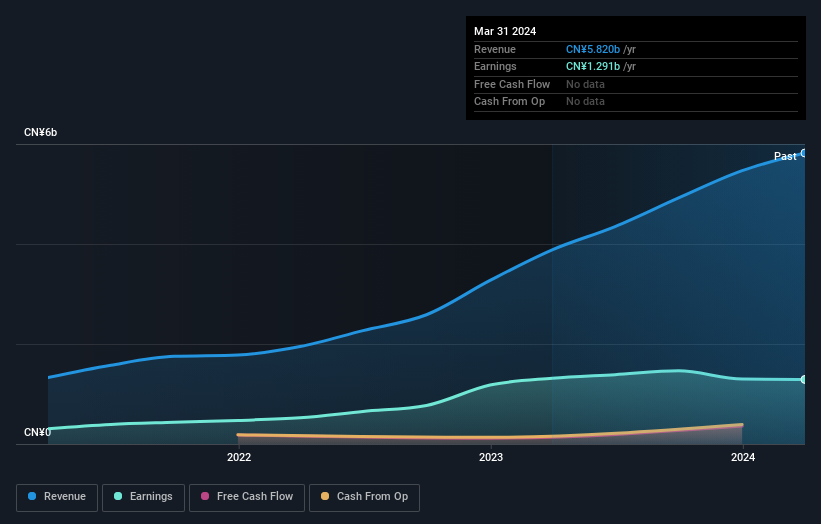- United States
- /
- Consumer Finance
- /
- NasdaqGM:JFIN
After the recent decline, Jiayin Group Inc. (NASDAQ:JFIN) CEO Dinggui Yan's holdings have lost 12% of their value

Key Insights
- Significant insider control over Jiayin Group implies vested interests in company growth
- The largest shareholder of the company is Dinggui Yan with a 66% stake
- Using data from company's past performance alongside ownership research, one can better assess the future performance of a company
A look at the shareholders of Jiayin Group Inc. (NASDAQ:JFIN) can tell us which group is most powerful. We can see that individual insiders own the lion's share in the company with 80% ownership. In other words, the group stands to gain the most (or lose the most) from their investment into the company.
And last week, insiders endured the biggest losses as the stock fell by 12%.
In the chart below, we zoom in on the different ownership groups of Jiayin Group.
View our latest analysis for Jiayin Group

What Does The Lack Of Institutional Ownership Tell Us About Jiayin Group?
Small companies that are not very actively traded often lack institutional investors, but it's less common to see large companies without them.
There are many reasons why a company might not have any institutions on the share registry. It may be hard for institutions to buy large amounts of shares, if liquidity (the amount of shares traded each day) is low. If the company has not needed to raise capital, institutions might lack the opportunity to build a position. On the other hand, it's always possible that professional investors are avoiding a company because they don't think it's the best place for their money. Jiayin Group might not have the sort of past performance institutions are looking for, or perhaps they simply have not studied the business closely.

Jiayin Group is not owned by hedge funds. Looking at our data, we can see that the largest shareholder is the CEO Dinggui Yan with 66% of shares outstanding. With such a huge stake, we infer that they have significant control of the future of the company. It's usually considered a good sign when insiders own a significant number of shares in the company, and in this case, we're glad to see a company insider with such skin in the game. With 11% and 2.1% of the shares outstanding respectively, Guanglin Zhang and Yifang Xu are the second and third largest shareholders. Interestingly, the third-largest shareholder, Yifang Xu is also a Member of the Board of Directors, again, indicating strong insider ownership amongst the company's top shareholders.
While studying institutional ownership for a company can add value to your research, it is also a good practice to research analyst recommendations to get a deeper understand of a stock's expected performance. As far as we can tell there isn't analyst coverage of the company, so it is probably flying under the radar.
Insider Ownership Of Jiayin Group
While the precise definition of an insider can be subjective, almost everyone considers board members to be insiders. Company management run the business, but the CEO will answer to the board, even if he or she is a member of it.
Most consider insider ownership a positive because it can indicate the board is well aligned with other shareholders. However, on some occasions too much power is concentrated within this group.
Our most recent data indicates that insiders own the majority of Jiayin Group Inc.. This means they can collectively make decisions for the company. So they have a US$262m stake in this US$326m business. It is good to see this level of investment. You can check here to see if those insiders have been buying recently.
General Public Ownership
With a 19% ownership, the general public, mostly comprising of individual investors, have some degree of sway over Jiayin Group. This size of ownership, while considerable, may not be enough to change company policy if the decision is not in sync with other large shareholders.
Next Steps:
I find it very interesting to look at who exactly owns a company. But to truly gain insight, we need to consider other information, too. Case in point: We've spotted 2 warning signs for Jiayin Group you should be aware of.
Of course, you might find a fantastic investment by looking elsewhere. So take a peek at this free list of interesting companies.
NB: Figures in this article are calculated using data from the last twelve months, which refer to the 12-month period ending on the last date of the month the financial statement is dated. This may not be consistent with full year annual report figures.
New: Manage All Your Stock Portfolios in One Place
We've created the ultimate portfolio companion for stock investors, and it's free.
• Connect an unlimited number of Portfolios and see your total in one currency
• Be alerted to new Warning Signs or Risks via email or mobile
• Track the Fair Value of your stocks
Have feedback on this article? Concerned about the content? Get in touch with us directly. Alternatively, email editorial-team (at) simplywallst.com.
This article by Simply Wall St is general in nature. We provide commentary based on historical data and analyst forecasts only using an unbiased methodology and our articles are not intended to be financial advice. It does not constitute a recommendation to buy or sell any stock, and does not take account of your objectives, or your financial situation. We aim to bring you long-term focused analysis driven by fundamental data. Note that our analysis may not factor in the latest price-sensitive company announcements or qualitative material. Simply Wall St has no position in any stocks mentioned.
Have feedback on this article? Concerned about the content? Get in touch with us directly. Alternatively, email editorial-team@simplywallst.com
About NasdaqGM:JFIN
Jiayin Group
Provides online consumer finance services in the People’s Republic of China.
Flawless balance sheet and good value.


